What is considered rude in Spain
Written by Nadia Podrabinek
Hello, my name is Nadia. I usually write about traveling (there are so many places to fit all the lifestyles), relocation, and living in a foreign country (adapting to a different culture). My travels stretch beyond Spain, with journeys to the US, Italy, Norway, Portugal, and France. Relocating to Spain in 2018, I lived in cities from Barcelona to Madrid, currently calling Valencia home. Follow me on Twitter, Facebook, Instagram, or LinkedIn! ... show more
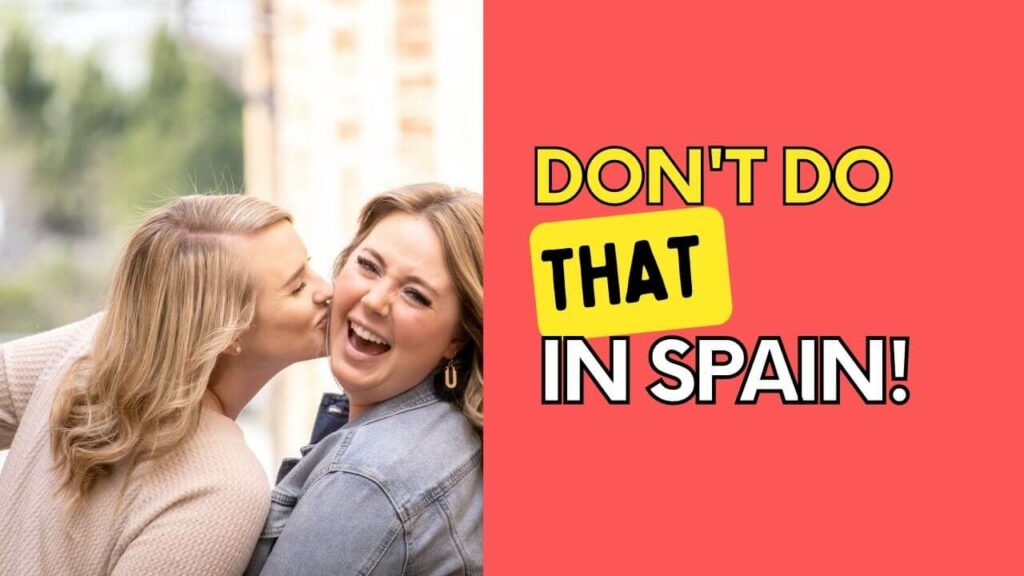
Spain is an awesome country, but like every other country, there are some behaviors that are considered rude. You’ll want to avoid these when you travel there.
There are many unwritten social rules that I’ve learned the hard way, so you don’t have to.
Wondering what the do’s and don’ts are in Spain? Follow this guide and you’ll certainly have a better experience traveling around this beautiful country.
What people say on Reddit
Don’t try to clap along if you’re watching flamenco.
Don’t criticize the person making the paella at a gathering.
Don’t mix up “te amo” and “te quiero.”That’s my couple of lessons learned as an American in Spain, lol. But seriously, as others have said, as long as you’re not a dick, you’ll be fine. We will make mistakes in a new cultural context. It will happen, and it’s not the end of the world. People here are pretty nice and not very uptight, from what I’ve experienced so far.
zydego
Don’t make fun of guys for not knowing how to fix shit.
This one isn’t that serious, but it’s one of the cultural shocks you’ll likely experience. I’m an American that’s been living in Madrid for 7 years and I was amazed that there’s basically none of the American cultural pressure on males to know how to repair things. For Spaniards, at least in the city, it’s perfectly normal to throw in the towel at anything more complex than a lightbulb and call for a pro.
Leighgion
Don’t talk a lot about your success. Envy is the worst feeling we have spaniards and if you got promoted, started a risky business or invested in something people dont understand, instead of trying to learn and celebrate your success you are going to recieve hostile vibes from some people.
Also, if you fail to rise higher, dont talk about the failing part haha. I dont know why we dont allow ourselves to fail to learn and do better next time, its like we like to kick someone who felt on the ground instead of healping lol
silvansalem
For me, and it’s just my humble opinion, you can do whatever you want. Obviously, if you are working don’t talk about politics too much, but feel free to ask and talk about whatever genuine question you may have. Of course, if you want to make an statement about the Catalonian Independence (as an example), be sure about what you’re going to say, to not disturb anyone.
Really, you will meet open minded people and the opposite. It’s up to you to decide the best occasion to talk or do something, but I’m sure you will be perfect.
Also, don’t expect perfect English, well, do not expect any spoken English in old or medium age people, especially random people.
Welcome to Spain (visit Barcelona too)!!
bdance5
What is rude for Spanish people?
1. Tipping with a US dollar

It is very insulting, and no one will appreciate your tip. Learn more about tipping etiquette in Spain.
2. Being too loud in public places
If you see a place where people tend to be quiet, do the same. Although there are many cafes and restaurants here and there in Spain where people are enormously loud, it is not always a good idea to be noisy at dining, especially on working days. Watch the restaurant’s atmosphere — if it is quiet, then you should be quiet also.
3. Sending food back in the restaurant
The rule of “customer is always right” is not working in Europe the way you might expect, and if you really want to, you may say, “Hi, the food is delicious, but do you think you could put it under the grill for another 10 minutes?”
4. Being fussy about punctuality
In Spain, it is considered rude to arrive on time. If it is your friend’s party, that will be probable okay. If not, you should always arrive half an hour later than you have been told. It is accepted as the social norm. If you turn up on time for a dinner party at someone’s house, it will be seen as you being rather pushy.
Helpful tip That does not apply to any formal appointment in Spain.
5. Taking the word “tomorrow” seriously
In Spain, there is an epic tradition of saying “mañana” (tomorrow), which is often used as a vague or polite way to end a conversation or make plans, without any firm commitment.
What do Spaniards mean when they say, “Let’s meet tomorrow” or “Let’s do it tomorrow,” or any other reference to tomorrow? It’s simply a typical way to end a conversation without making a solid commitment. The event may happen, or it may not, and no one will be offended either way.
It isn’t considered rude to say “tomorrow” without following through on the implied promise, but it may be seen as rude to expect otherwise.
6. Asking about someone’s work and salary straight away
In Spain, it’s considered inappropriate to start a conversation with questions about work and money. Instead, just go with the relaxed and natural flow of the dialogue. Stay casual and be cool with that.
7. Unknowingly use rude gestures in Spain
All the rude gestures you use in your country are usually just as hostile in Spain. However, there is one more gesture that has a negative side:
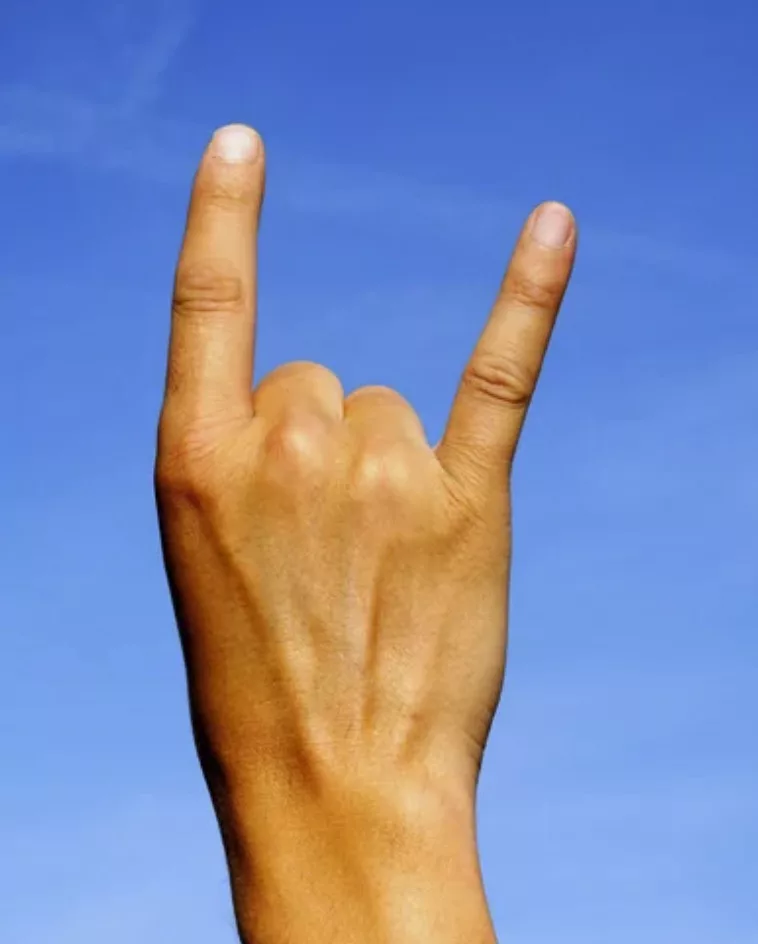
You might have used the rock-and-roll gesture at rock concerts, extending your index finger and pinkie while the other fingers are curled up. However, in Spain, it means the sign of the horns (husband of a cheater), which is an insult.
8. Slurping, burping
Although it might be seen as appreciation in some Asian countries, it never does that in Spain. It’s just rude.
9. Generalizing on Spain

Don’t generalize about Spain because each region has its particularities, and it’s not traditional to dance flamenco or go to watch bullfights. Also, many Spanish are very sensitive about their regional customs and languages (there are other spoken languages in Spain, e.g., Catalan, Valenciano, Basque, etc.)
10. Not greeting properly
In Spain, it’s common to greet others with a kiss on both cheeks. Failing to do so can be seen as standoffish or rude. However, it’s important to note that this is usually reserved for friends and acquaintances, not strangers.
11. Assuming everyone speaks English in Spain
Another thing to avoid in Spain is presuming that everyone speaks English. Spaniards’ English proficiency varies among individuals and locations, so don’t expect everyone to understand the language.
As a tourist, it’s better to learn key Spanish phrases such as “hola” (hello), “encantado / encantada” (nice to meet you), “gracias” (thank you), “por favor” (please), “disculpa” (excuse me) are very basic and easy to remember.
There are also locals who can understand common English words, so don’t be afraid to approach them and ask, “Hablas Inglés?” (Do you speak English?).
What are Do’s and Don’ts in Spain?
These are odd and sometimes rude things that can avoid doing in Spain. Let’s begin with the food and dining etiquette because a lot of life in Spain revolves around it.
Don’t eat early
Don’t go for lunch before 1 p.m. and for dinner before 8 p.m. Even if you arrive at the restaurant at 8 p.m., it could be a bit early. The Spanish eat late, so be aware of that when planning your meals in Spain.
Don’t eat a light lunch
When you’re going to lunch — eat up! As I mentioned before, the Spanish eat late, and they don’t want to go to bed with a full stomach. They usually have lighter food for dinner, like tapas, salads, and seafood dishes. Consequently, lunch is going to be the heaviest meal of the day in Spain, and that’s where you’re going to find things like paella, pasta, and other heavier foods that we normally associate with dinner.
Don’t eat paella for dinner
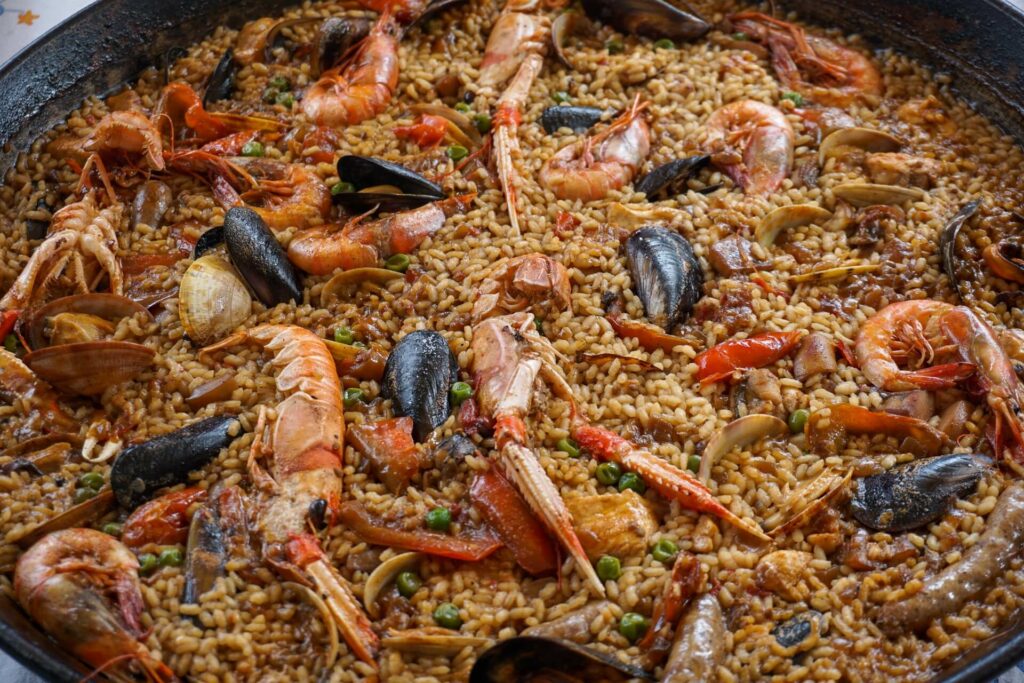
Spanish people eat dinner pretty late, usually at 8:30 p.m., and paella is considered too heavy to eat that before the night. If you find a place that serves paella for dinner, it’s probably geared towards tourists, and it’s not going to be a good paella.
Don’t eat paella with the fork
You should always eat paella with a spoon, but it is okay if you’re using a fork. It will never be rude to the Spanish, and most of them just don’t care much about travelers not knowing the traditions.
Don’t expect an American-style breakfast
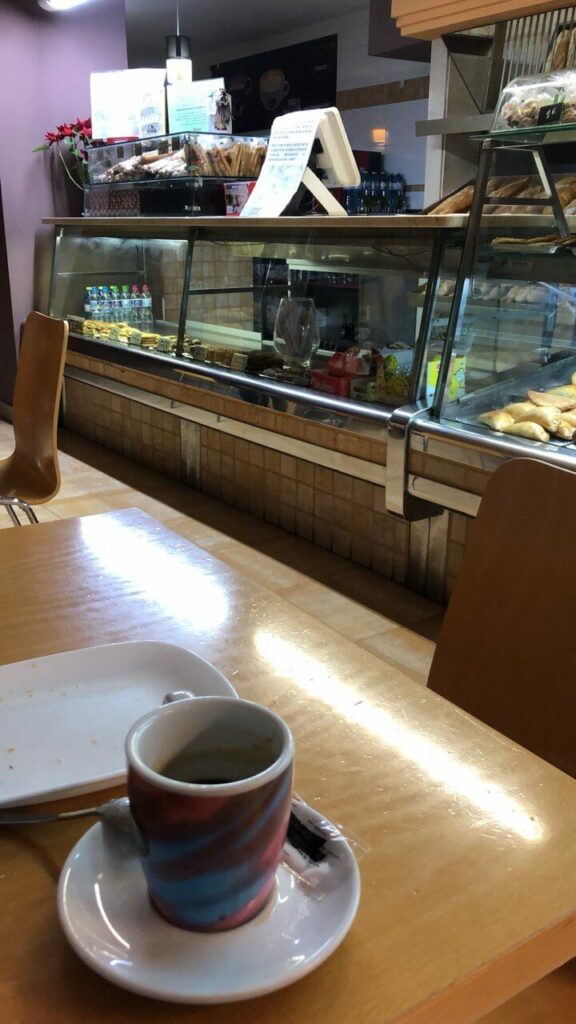
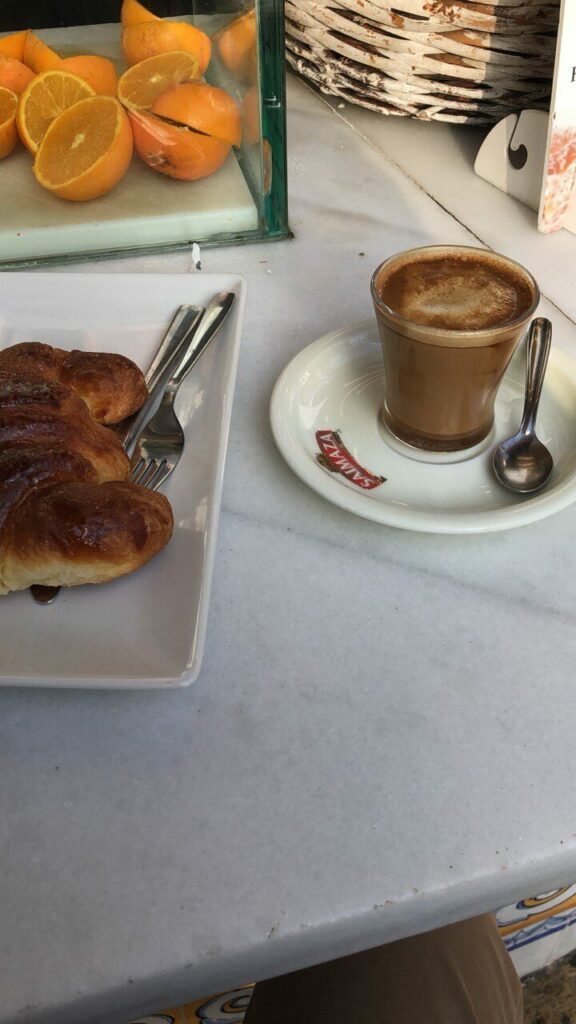
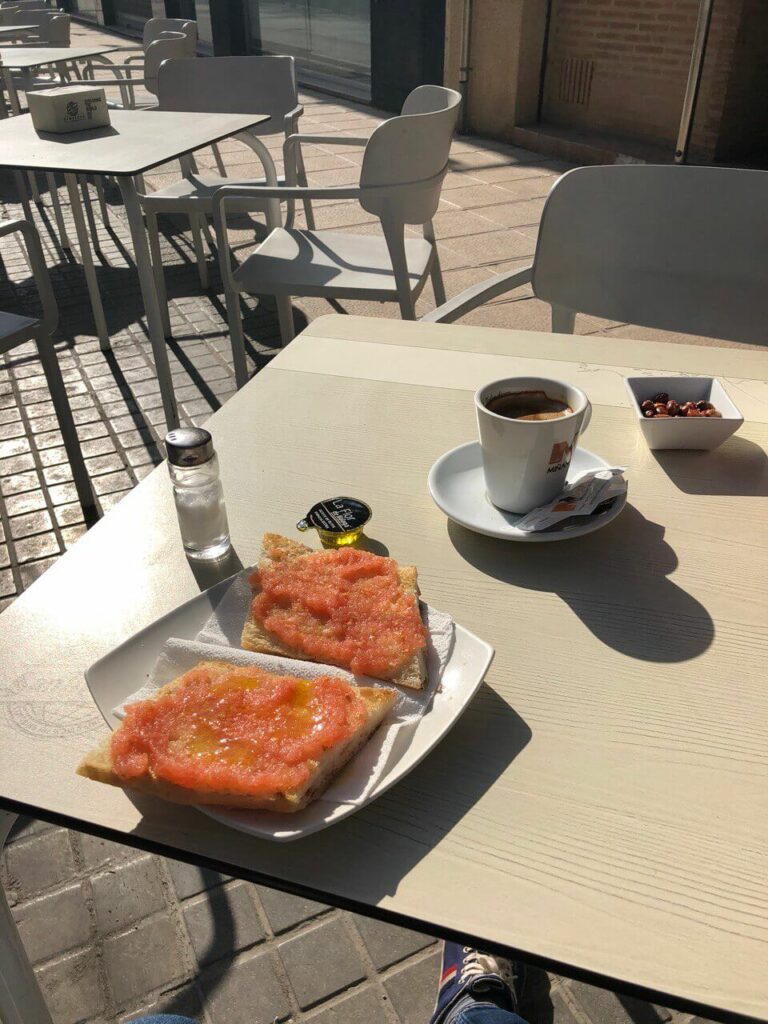
Spanish people do not eat what many of us consider breakfast food, and it will be a toast with olive oil and crushed tomatoes or a toast with butter and marmalade in the morning. And some coffee. So don’t expect to find a breakfast spot where you can eat up with bacon and eggs, pancakes, etc. If you do find it, you’re lucky then.
Don’t expect quick service in Spanish restaurants
Eating in Spain is an event. First, you enjoy a drink. Then, you sample some bread, olives, and jamón (Spanish ham). Next, you savor some wine before moving on to your main course. Following this, you have coffee and dessert while continuing the conversation, and so on.
Don’t think you have to tip in Spain
The most popular traveler’s question—is it rude not to tip in Spain? No, it’s not rude.
Tipping is not expected in Spain. Did you like your meal at the restaurant? Now you can leave some extra to show how much you appreciated the service. Or you may not. Not a big deal, absolutely!
Do ask for a check in the restaurant
Nobody is going to bring you a check in a Spanish restaurant unless you ask for it. You can sit around for many hours, and you’re still not going to receive the check. So, ask for it, and that is absolutely normal here.
What should I avoid in Spain?

You should also avoid doing these things, but don’t follow these rules strictly and literally. Each person is a world unto themselves, and there are many exceptions to the rules.
- Avoid saying “thank you” and “please” constantly.
The tone of voice is essential in Spain. You may talk with a portion of respect, and that is how you show your gratitude to the people you’re talking to. - Don’t go shopping, run any errands between 2 p.m and 5 p.m.
It will not work, you will find that everything is closed except for supermarkets. - Don’t give two kisses, starting on the wrong side.
If you’re the person who gives two kisses, you need to start from the left side. - Don’t ignore the meal times.
You can have dinner at 6 p.m., but if you want to make plans with local people or go to a restaurant, it will not work well. - Don’t just eat and leave right away.
If you have time, the after-dinner conversation may last for many hours. - Don’t take it seriously or take it to heart when they call you handsome or pretty in the shop (“guapo”/”guapa”). It’s very common in Spain when they say that.
- Don’t pronounce English words as they are really pronounced.
The Spanish always try to Spanishize everything. If you ask for a WiFi password in the cafe, they may not understand you because you have to say “wee-fee” instead of English or American pronunciation.
What are some taboos in Spain?
First off, this one is really funny: in Valencia, there are plenty of taboos related to paella. This includes what ingredients are acceptable and where to eat it, among other things. Try telling one of Valencians that you ate a paella in Madrid that had peas and red pepper. Then, enjoy their reactions. 🙂
But generally speaking, the strongest taboos in Spain are often related to politics. For instance, discussing Basque terrorism with Basque people can quickly become awkward and creepy.
As for social taboos, perhaps the most notable ones relate to salary and wealth. Many people with high salaries typically avoid discussing them, and they might consider you rude if you ask about it. The same goes for wealth. However, if a person’s salary is low, there’s usually no problem discussing it, often in a tone of complaint.
Other taboos
- Don’t refer to a younger woman as “Señora”. This can make people feel old, for sure. Just keep in mind, Spaniards don’t really associate this with marital status, but rather as a distinction between old and young. For a woman, the first time being called “Señora” is a significant moment.
- Similarly, using “usted” with anyone under about 65
- Claiming that Italian “prosciutto crudo” is better than jamón.
- Saying that Catalan, Valenciano, or Gallego is “basically a dialect” can also be controversial. For example, while “Valenciano” is technically a dialect, it’s a politically charged topic to bring up.
Final Thoughts
So now that you know a little bit about what is considered rude in Spain, what do you think? Were there any surprises for you? Let me know in the comments below! And if you’re traveling to Spain, keep this list of do’s and don’ts with you.

12 replies on “What is considered rude in Spain”
Love your travel blog/tips. I’m interested in staying in Valencia for at least 3 months when i retire in a few years. So I’ll keep all your wonderful advice in mind once I begin my search for a place in Valencia. PS: I have a dog and would like to bring him with me. Any thoughts on pets would be appreciated. Best
PPS: I just followed you on X.
Nadia, how are you? We read your article and found some of the explanations surprisingly helpful. Thank you so much. Gracias🙏
Hi Nadia,
I found this very helpful. My husband and I live in the US and we’ve been to Spain before but have never stayed more than a week. This time we are thinking of staying > a month mainly in Valencia and Madrid in September/October 2023. Will be looking for more of your posts. Thanks
Hi Maria,
Thank you so much! It is the best time to come to Spain, happy travels!
I am an older USA university professor who will be retiring in Valencia by August 2023, single, (well divorce) and I am looking for a house minimum 3 bedrooms 3 bathrooms in the outskirt of the city but with good Metro system (Cañada ?) or an apartment in the city with same type of accommodations. Either choices have to be full furniture. Beside English I also speak fluent Spanish, some German and Italian as well.
As a musician (voice) an apartment should have excellent sound proof in order to don’t disturb the neighbors; also the building most have elevators. If you have any suggestion, por favor de comunicarse conmigo atraves de email. Muchas gracias y esperanto noticias.
I’ve just semi retired to Andalusia.
I found my property in the Sierra Nevada national park through a local estate agent.
First find the exact area you’d like to live. Google it, watch videos on YouTube and read reviews.
Second google all the local estate agents. Visit their websites and write down an exact list of your must haves and would likes. Just go through everything within your price range and those that are about ten to twenty thousand above your top price. Reductions can be quite large if you haggle and start at a very low price.
My place ended up being reduced from £350,000 to £250,000. I snapped it up.
It’s got 13 acres, stables, orchards, allotment, large three bedroom villa and two two bedroom cottages as well as a ruin and a caravan. I’m going to run it as an Airbnb and spend the rest of my time baking and tending to the grounds and making jam, marmalade and other things.
Never arrive 30 minutes late. That advise is terrible. Being late is considered rude and slightly acceptable only among friends. You are expected to arrive in time and people won’t be bothered if you are 15 minutes late however punctuality is a must.
*advice *on time *only slightly *but people won’t be bothered *late. However
Heyy so I moved from Spain to England over a year ago after living in Catalunya for more than 10 years and I’ve always wondered what it is about Spanish people that makes their whole world so different from the British. This post really helped me see it more clearly.
Mira, ni llevo tanto tiempo aquí, pero ya me cuesta hablar directamente en Español o Català como solía hacer. Ya te digo yo que los Britnànicos imponen sus maneras de ser mucho más que los Españoles. Soys gente de mente más abierta y aceptáis la diversidad con más gusto, mientras que aquí todos son reservados, rígidos, se toman las cosas literalmente y esperan que actúes de cierto modo sin ser unos con la diversidad y las personalidades distintas. Hecho mucho de menos España y las costumbres de su gente, enserio.
Igualmente, ¡gracias por esta publicación! Ha sido agradable leerla :))
Hey, Mariam! Thanks, I am really glad it helped you!
¡Muchas gracias, felices fiestas!
Very nice post
Thank you, Woodward